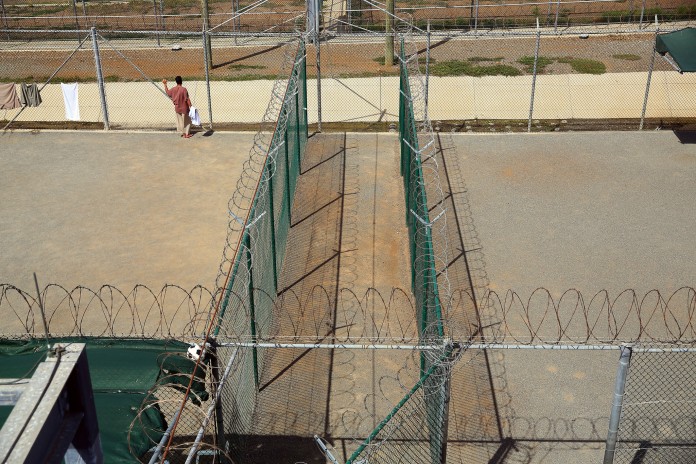Al-Thawra Net
July 29th, Charlie Savage wrote a humanitarian story for the New York Times that explained the suffering of a free Yemeni prisoner after 13 Years in Guantanamo prison.
TALLINN, Estonia — When guards brought Ahmed Abdul Qader to the plane that would take him away from the Guantánamo Bay prison a year and a half ago, he asked permission to pause before boarding. Closing his eyes, he tried to leave behind the burden of his 13 years of captivity.
Mr. Qader was about 17 — an overweight Yemeni teenager suspected of being a terrorist — when the United States military brought him to Guantánamo. When he left, he was past 30, his hair thinning, and about to start a new life in Estonia, a tiny Baltic country he had never heard of before it had decided to resettle a detainee a few months earlier.
A day later, he was in his new home, a modestly furnished studio apartment in Tallinn provided by the Estonian government. But the past, he soon realized, was not so easy to escape. Snow was falling, and he was eager to touch it. He started for the door, then suddenly panicked, fearful that something — he was not sure what — could go wrong if he went outside.
“Any trouble I get myself in now — even an honest mistake — will be a hundred times worse than if any normal person did it,” Mr. Qader said recently, trying to explain how that sense of paralysis has stayed with him.
“I thought that after two months’ release, I’d be back to normal,” he said. “But I cannot live my life regularly. I try, but it is like part of me is still at Guantánamo.”
Mr. Qader is one of about 780 men who have been held at the prison since the Bush administration opened it after the Sept. 11, 2001, attacks. A central part of the war on terrorism, Guantánamo was an experiment: using indefinite detention without trial, a tool of traditional wars, for an open-ended conflict in which distinguishing truly dangerous enemies from people caught on the periphery can be particularly difficult.
President Obama inherited 242 detainees when he came into office vowing to close the prison. Today 76 remain, 32 of them approved for transfer to a stable country willing to accept them. Congressional Republicans oppose closing the prison and further transfers, pointing to the minority of former detainees accused of recidivism.
In the long and contentious debate over Guantánamo’s future, former detainees who have been transferred and caused no problems have been largely forgotten. But while their files may have been closed, the ambiguity surrounding their release — deemed safe enough to transfer, but never proven guilty or innocent — continues to brand them.
Mr. Qader recently told me his story in a series of conversations over several days this spring — in his apartment, strolling through Tallinn’s medieval Old Town, and riding a city bus to Estonia’s Islamic Center.
He expressed gratitude to Estonia for taking him in. Its refugee program provides him with the apartment, health care, language classes, a small monthly stipend and a mentor to help him navigate daily life.
He smiled often and spoke with optimism about the future when we talked. But he also lapsed into despondency about his separation from his family, his lost youth, and his “hurt” when people call him a terrorist. He portrayed himself as paralyzed by anxiety about what others — the police, potential friends or employers — will assume about him.
“Thirteen years of my life I wasted, and it’s not because of something I did,” he said. “It’s because something went wrong around me, and I got the blame for it.”
Arrest on Thin Grounds
Mr. Qader was arrested with about a dozen other Arabs at a guesthouse in Pakistan in March 2002. That night, the Pakistani police also raided another guesthouse in the same city, capturing a prominent terrorism suspect, Abu Zubaydah.
The police conflated the two houses, saying both harbored what were thought to be cells of Al Qaeda. But the evidence linking the group to Mr. Qader’s house, where many residents claimed to be religious students, was thinner.
Mr. Qader was transferred to American custody, and that June, he was flown to Guantánamo. He vividly recalls the “long, long, long” flight to Cuba — limbs immobilized, eyes and ears blocked, destination unknown.
At first, Mr. Qader said, guards were often rough. An Estonian doctor is treating him for ligament damage in his knees and shoulder — the result, he said, of treatment like being kicked into the kneeling position or being forced to kneel on concrete with his arms extended.
Asked what provoked punishment, he sang a lyric from a prisoners’ song in “Les Misérables”: “Look down, look down / Don’t look ’em in the eye.”
Every few months, Mr. Qader was brought to a trailer and questioned. He told interrogators that after completing the ninth grade in Yemen in 1999, he had traveled to Pakistan intending to study religion and computers, and to do charitable relief work. With the financial support of his father, he traveled around, staying for several months at a time in different guesthouses.
He also crossed into Afghanistan, where he said he met several Taliban members who invited him to an area north of Kabul behind the front lines in their war against the Northern Alliance. He lived there about 10 months.
Continue reading the main story
Reports summarizing his early interrogations say he was “issued” a rifle and “trained” to use it. Mr. Qader, claiming translators had put an exaggerated gloss on his words, told me a Taliban member spent a few minutes showing him how to hold and shoot a rifle, and he never “owned” one.
Either way, Mr. Qader insisted, then and now, that he never fought or enlisted with any group, and in late 2001, he returned to Pakistan, where he was eventually arrested.
“As unusual as this source’s story sounds, I don’t think he is hiding the truth,” an interrogator wrote about Mr. Qader in January 2003.
But when the interrogators showed his photograph to other detainees, some claimed he was involved with Al Qaeda. The military compiled his story and those accusations in a 2008 dossier, which described him as a Qaeda member. The dossier was leaked, and it is readily available on the internet.
Over the years, Mr. Qader said, his bewilderment at being in Guantánamo gave way to routine. Conditions gradually improved. By reading books and talking to guards, he learned English.
Still, the 2008 dossier described him as “noncompliant and hostile to the guard force.” Mr. Qader said that in 2007, believing certain guards treated him unfairly, he “pushed back” by refusing for a while to obey orders, like to leave a yard when his outdoors time was up.
In 2009, a six-agency detainee review task force re-evaluated Mr. Qader and, according to someone who read its report, concluded he had not conducted or facilitated any terrorist activity against the United States or its allies.
That finding, officials said, is echoed in many reports about low-level detainees, and it is ambiguous: It could either mean he was innocent or, though part of the enemy, did nothing specific. Either way, the task force deemed him a low enough risk to be transferred.
But after an unsuccessful attempt by Al Qaeda’s Yemen branch to set off a bomb on a Detroit-bound plane that Christmas, Mr. Obama halted repatriations to Yemen until its security improved. The moratorium spurred the Justice Department to appeal government losses in habeas corpus lawsuits, and in 2010, an appeals court instructed judges to interpret ambiguous evidence more toward the government.
Detainee victories ceased. Mr. Qader’s lawsuit, brought by Wesley Powell, a New York lawyer, reflected the pattern: A judge ruled his detention lawful.
By then he lived on a cellblock for the most compliant and westernized detainees — those who liked watching American movies despite actresses with uncovered heads. When a hunger strike swept the prison in 2013, they did not participate, he said, although he had sometimes participated in earlier such protests.
Finally, in 2014, the Obama administration stopped waiting for Yemen to stabilize and began pressing other countries to resettle stranded Yemenis. After Russia intervened in Ukraine, Estonia — another former Soviet republic, and a NATO member — agreed to take one.
“Estonia understood the value in demonstrating its reliability as a friend and ally and was willing to help us,” recalled Jeffrey Levine, then the American ambassador to Estonia.
Ian Moss, the chief of staff in the State Department office that negotiates transfers, remembers watching Mr. Qader’s interview with Estonian officials. He was struck by Mr. Qader’s reply when asked when he was born. (He says November 1984; some files say 1983.)
“My birthday will be the day I leave Guantánamo,” Mr. Qader said.
‘Like a Newborn’
At first, he recalled, he processed everything in his new country “like a newborn,” unaware that his transfer was controversial.
But the timing was terrible — his release, on Jan. 14, 2015, came a week after a terrorist attack in Paris and as the Syrian refugee crisis was mounting. In the United States, Senator Lindsey Graham, Republican of South Carolina, told Fox News, “It is insane to be letting these people out of Gitmo to go back to the fight.”
Some Estonians were upset, too, like the reader of a news article about his arrival who appended the comment: “I say out of the country, now!”
Mr. Qader recalled thinking: “I think I will never be free until I get my name cleared. I will always be ‘that guy who was in Guantánamo.’ ”
He decided to keep a low profile, declining interviews and telling few people about his past.
That summer, a shop in Tallinn gave Mr. Qader an apprenticeship. The owner later told me how he came to suspect that the refugee was the Guantánamo detainee he had read about in the news media.
He found the dossier online but concluded that its terrorism accusations were “all bullshit.” One morning, he told his apprentice that he was “famous.” Mr. Qader acknowledged who he was, expecting to be told to leave.
Instead, the owner invited him to visit his mother on an Estonian island. Mr. Qader — apprehensive about leaving Tallinn — hesitated for days but went.
Not all Estonians were as welcoming.
Last fall, a drunken neighbor began hassling him about being a foreigner, Mr. Qader said. When it escalated — the neighbor threatened him with a gun and put garbage at his door — he called the police. The harassment ceased.
But days later, two police officers showed up and grilled Mr. Qader — asking where he came from and got money. When he explained, they conferred in Estonian; he understood the word “Cuba.”
They said not to worry. But he said he could not sleep for four days.
Now, when Mr. Qader contemplates the future, he said, he feels like a man holding a “small candle.”
“People tell me ‘don’t look back, look forward,’ but the problem is when I look forward, it is dark,” he said. “That is what scares me the most.”
Estonia recently extended his residency permit by two years. But its population of 1.3 million people includes only a few thousand Muslims and fewer Arabs. Halal food is scarce, and Mr. Qader interprets stares on the bus as hostile.
He would like to return home, but he said he feared that Yemeni or American security forces might mistakenly decide he was working with terrorists and jail him again — or kill him with a drone.
Estonia will permit family visits, but obtaining travel documents has proved difficult. His father, who had a heart attack after finding out he was at Guantánamo, calls him daily, and his mother has taught him to cook over Skype.
Last year, Mr. Qader’s family helped arrange for him to become engaged to one of his sisters’ friends. Estonia permits spouses to join refugees, so they were married in December by a Yemeni judge over Skype. They now talk daily, he said, but his wife has not managed to come yet, either.
In theory, he could visit nearby European countries — he is supposed to consult Estonian officials first — but he has not dared leave. Comforted by the thought that the Estonian government is monitoring him, he fears that if he travels abroad and a bomb goes off nearby, he might be unable to prove his innocence and would be scapegoated and imprisoned again.
Asked what he thinks about the United States, Mr. Qader said he understood why, after Sept. 11, it would detain him. Still, he said, it should have freed him after a year or two; imprisoning him for so long “hurt me very bad.”
Emphasizing that he is “not out for revenge,” he “begged” American officials to consider helping him move on by clearing his name.
“Now you let me go,” he said. “Thank you very much. No hard feelings. But just let me go for real. Say, ‘This guy, we hold him this long and we were mistaken, we’re sorry,’ and show people the truth.”
But Lee Wolosky, the State Department’s special envoy for the closing of Guantánamo, demurred, saying “no apology is warranted” for Mr. Qader’s detention, given the circumstances.
“The United States was correct to pick him up when and where we did and to detain him for a period of years,” he said. “We were also right ultimately to release him subject to security assurances.”
Either way, Mr. Qader knows some things are up to him.
Not long ago, he said, he heard a story about elephants who died in a circus fire. They were tied with a flimsy rope but had been trained in chains as babies, learning not to try to break free.
“When this story hit me, I was thinking, ‘I don’t want to be locked inside my own Guantánamo,’ ” he said. “I promised myself that I have to break free from myself. And I told my wife, ‘I will take you to Paris.’ ”
Mr. Qader said his wife, who has never left Yemen, replied that when she finally reached Estonia: “I will explore the world with you. I will hold you to your word.”



























